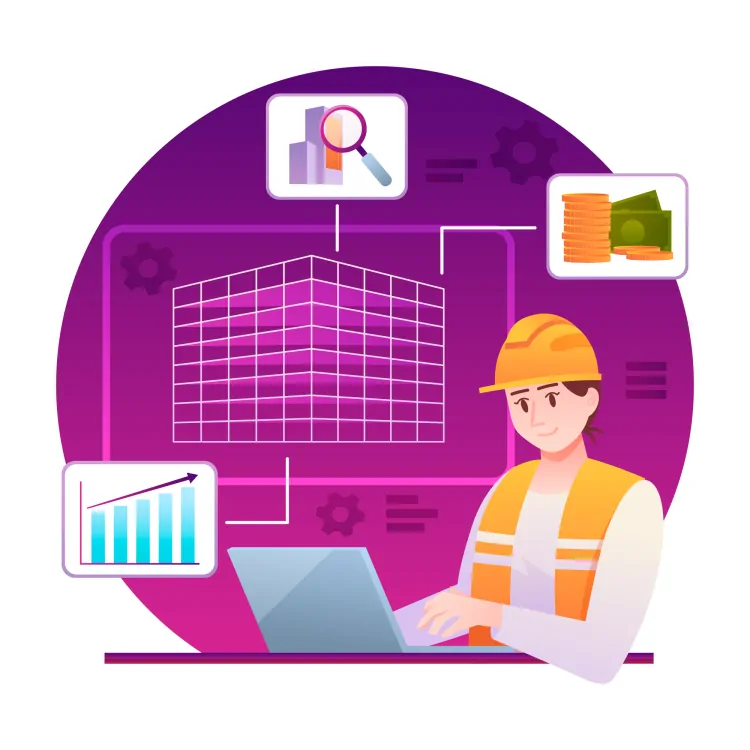The Critical Need For Technology Proficiency Among Quantity Surveyor Professionals
In the rapidly evolving construction industry, the role of quantity surveyors (QS) is undergoing significant transformation due to technological advancements.

Technology proficiency has become essential for professionals in all sectors, particularly for quantity surveyors in the construction industry. As the construction landscape transforms through advancements in digital tools and methodologies, quantity surveyors must adapt to these changes to remain relevant and effective.
This article discusses the critical need for technology proficiency among quantity surveyor professionals, highlights its impact on efficiency, accuracy, collaboration, and overall project success and suggests a quantity surveyor course that can equip you with the needed technological skills.
Understanding the Role of Quantity Surveyors
The role of quantity surveyors has been changing with the evolving nature of the construction industry. Earlier, quantity surveyors took care of cost management, budgeting, and financial planning from inception to completion. Their expertise in measurement, valuation, and cost control has always been crucial for ensuring projects are delivered within budget and on time. Today, the traditional methods of quantity surveying are being complemented, and in some cases replaced, by technology-driven solutions.
There is a rising need for quantity surveyors to incorporate data and technology into their model-centric and data-driven process. This is important for them as this will help these professionals stay relevant in the current dynamic. Incorporating and leveraging data and technology to the core practices of quantity surveying will help make informed decisions, reduce costs, enhance efficiency, encourage and promote sustainability and will result in better value for money, for all the stakeholders.
What are the Emerging Industry Trends?
The construction industry is undergoing a technological renaissance! Modern trends such as the Internet of Things (IoT), artificial intelligence (AI), and data analytics are transforming the way projects are designed, executed, and managed.
Quantity surveyors who are proficient in these technologies have the advantage to leverage their capabilities to enhance their practice. For instance, a quantity surveyor can take an AI’s assistance to predict analytics, which will help quantity surveyors forecast costs and project timelines with greater accuracy.
Moreover, the evaluation of the environmrntal impact of materials and the construction project can be better calculated using technology. This becomes more important as sustainability becomes a significant focus within the industry. This knowledge also gives an idea of what to advise clients on sustainable practices and ensuring compliance with regulations.
Role of Technology Proficiency Among Quantity Surveyor Professionals
-
Enhanced Efficiency
Modern software tools such as Building Information Modeling (BIM), cost estimation software, and project management systems have enabled quantity surveyors to streamline processes that were previously labor-intensive and time-consuming.
For example, BIM allows for accurate 3D modeling of construction projects, which helps in visualising the entire scope of work and assessing quantities with precision. This technology not only saves time but also reduces the risk of errors that can lead to cost overruns.
Moreover, automation tools handle repetitive tasks such as data entry and report generation. This frees up quantity surveyors to focus on more strategic aspects of their roles. By embracing these technologies, professionals can significantly improve their productivity and contribute to more efficient project delivery.
-
Improved Accuracy and Reduced Risks
The construction industry is a risk-intensive industry, particularly concerning budget overruns and project delays. Technology proficiency enables quantity surveyor professionals to leverage sophisticated analytical tools that enhance accuracy in cost estimation and risk management.
Technology can assist in the identification and mitigation of risks early in the project lifecycle. Risk management software can help quantity surveyors assess potential risks associated with various project elements. This allows for proactive measures to be implemented. This foresight can save projects from costly disruptions and improve overall financial outcomes.
-
Facilitates Collaboration and Communication
The construction industry is inherently collaborative, involving multiple stakeholders such as architects, engineers, contractors, and clients. Technology proficiency plays a crucial role in fostering effective communication and collaboration among these parties. Tools like cloud-based project management platforms allow for real-time sharing of information and documents. This ensures that all stakeholders are on the same page.
Adopting technology improves transparency in the decision-making process. This transparency is essential for building trust among stakeholders and ensuring that everyone is aligned with project goals.
Conclusion
The critical need for technology proficiency among quantity surveyor professionals cannot be overstated. As the construction industry continues to evolve, quantity surveyors must embrace technology to enhance efficiency, improve accuracy, facilitate collaboration, and adapt to emerging trends.
They can do so by pursuing modern quantity surveying courses like best MBA courses in Construction Economics and Quantity Surveying. Such programmes will not only increase their value to employers and clients but also ensure their own professional growth and relevance in a competitive job market. The future of quantity surveying is undoubtedly intertwined with technological advancement, and those who proactively acquire these skills will lead the way in shaping the industry’s future.
What's Your Reaction?














